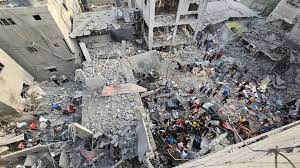Palestinian death toll reaches 22,313, says Gaza Health Ministry
3 January 2024
Israeli forces intensified their bombing of the Gaza Strip on Wednesday and told civilians to leave a refugee camp in the north of Gaza after the war stretched into Lebanon with the killing of the Hamas deputy leader in Beirut, according to a Reuters report.
The Israeli military said in its daily briefing that “intensive battles” with militants were continuing in Gaza on Wednesday in the southern city of Khan Younis. Residents and Palestinian media said Israeli forces bombed Al-Nusseirat refugee camp in the northern part of the Hamas-ruled enclave overnight and into Wednesday, destroying several multi-floor buildings.
Israeli planes also dropped leaflets on Al-Nusseirat ordering people to leave seven districts. “You are in a dangerous combat area. The IDF is operating heavily in your area of residence. For your safety the IDF urge you to immediately evacuate this area and leave towards the known shelters in Deir Al-Balah (west),” the leaflets said.
Israeli warplanes and tanks also stepped up attacks on the Al-Bureij refugee camp.
Hamas’ armed wing said it had killed 10 Israeli soldiers in fighting in Al-Bureij and hit five tanks and troop carriers. The Israeli military said the number of its soldiers killed since its first incursion into Gaza on Oct. 20 had reached 177.
In the Al-Maghazi refugee camp, health officials said at least four people were killed in an Israeli air strike on a house. They said three people were also killed in an air strike on a house in Rafah in the south of Gaza.
Israel says it tries to avoid harm to civilians. But the total recorded Palestinian death toll had reached 22,313 by Wednesday, 128 of them in the past 24 hours, the Gaza health ministry said.
Its 2.3 million residents are engulfed in a humanitarian disaster in which thousands have been left destitute, crammed into shrinking areas in the hope they are safe and threatened by famine due to a lack of food supplies.
Hundreds of Palestinians took to the streets of Ramallah and other towns in the West Bank to condemn Arouri’s killing, chanting, “Revenge, revenge”.
Iranian foreign ministry spokesman Nasser Kanaani said Arouri’s killing would “ignite another surge in the veins of resistance and the motivation to fight against the Zionist occupiers…”
Shortly before Arouri’s killing, Hamas’ paramount leader Ismail Haniyeh, who is also based outside Gaza, said the movement had delivered its response to an Egyptian-Qatari ceasefire proposal. He reiterated that Hamas’ conditions entailed “a complete cessation” of Israel’s offensive in exchange for further releases of hostages.
The assassination of Hamas senior leader Saleh al-Arouri in the Lebanese capital on Tuesday was a sign that the nearly three-month war between Israel and Hamas was spreading across the region, drawing in the occupied West Bank, Hezbollah forces on the Lebanon-Israel border, and even Red Sea shipping lanes.
Arouri, 57, who lived in Beirut, was the first senior Hamas political leader to be assassinated since Israel began its offensive against the militant group in response to its deadly rampage into Israeli towns on Oct. 7.
Hamas politburo member Hossam Badran said in a eulogy for Arouri: “We say to the criminal occupation (Israel) that the battle between us is open.”
Israel had long accused him of orchestrating attacks on its citizens. But a Hamas official said he was also “at the heart of negotiations” conducted by Qatar and Egypt over the outcome of the Gaza war and the release of Hamas-held Israeli hostages.
Hezbollah chief Sayyed Hassan Nasrallah was due to make a speech in Beirut on Wednesday afternoon. Previously he had warned Israel against carrying out assassinations on Lebanese soil, vowing a “severe reaction”.
The heavily armed Hezbollah has been exchanging near-daily fire with Israel across Lebanon’s southern border since the Gaza war began. More than 100 Hezbollah fighters and two dozen civilians have been killed on Lebanese territory, as well as at least nine Israeli soldiers in Israel.
Following Arouri’s killing, the U.N. peacekeeping mission in Lebanon said it was deeply concerned about the possibility of an escalation “that could have devastating consequences for people on both sides of the border”.




